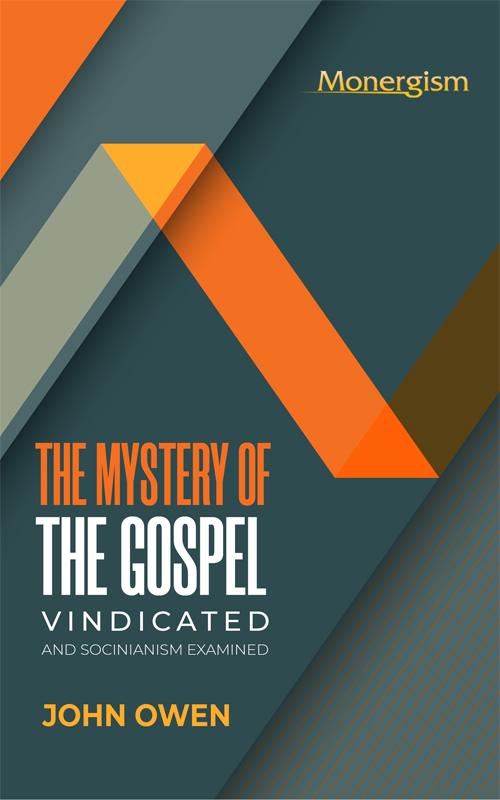 by John Owen
by John Owen
in ePub, .mobi & .pdf formats
In the 1650s, historic Christianity in England was challenged by Socinianism. This heretical system was to a large extent based on Arianism, which had plagued the ancient church. Owen wrote his Vindiciæ Evangelicæ after being commissioned by the Council of State to refute Socinianism. In it he deals with the writings of John Biddle, ‘the father of English Socinianism,’ Hugo Grotius, the famous Dutch statesman and philosopher (who was not an avowed Socinian) and the Racovian Catechism, which was associated with Socinus himself. (CCEL)
Socinianism is a heretical nontrinitarian belief system named after the Italian theologians Lelio Sozzini and Fausto Sozzini, uncle and nephew, respectively, which was developed among the Polish Brethren in the Polish Reformed Church during the 16th and 17th centuries and embraced by the Unitarian Church of Transylvania during the same period. It is most famous for its Non-trinitarian Christology but contains a number of other heterodox beliefs as well.
----
Table of Contents
PREFATORY NOTE BY THE EDITOR
Dedication
Epistle Dedicatory
Preface to the Reader
Mr Biddle's Preface to his Catechism
Mr Biddle's Preface briefly examined
I.—Mr Biddle's first chapter examined—Of the Scriptures
II.—Of the nature of God
III.—Of the shape and bodily visible figure of God
IV.—Of the attribution of passions and affections, anger, fear, repentance, unto God—In what sense it is done in the Scripture
V.—Of God's prescience or foreknowledge
VI.—Of the creation, and condition of man before and after the fall
VII.—Of the person of Jesus Christ, and on what account he is the Son of God
VIII.—An entrance into the examination of the Racovian Catechism in the business of the deity of Christ—Their arguments against it answered; and testimonies of the eternity of Christ vindicated
IX.—The pre-eternity of Christ farther evinced—Sundry texts of Scripture vindicated
X.—Of the names of God given unto Christ
XI.—Of the work of creation assigned to Jesus Christ, etc.—The confirmation of his eternal deity from thence
XII.—All-ruling and disposing providence assigned unto Christ, and his eternal Godhead thence farther confirmed, with other testimonies thereof
XIII.—Of the incarnation of Christ, and his pre-existence thereunto
XIV.—Sundry other testimonies given to the deity of Christ vindicated
XV.—Of the Holy Ghost, his deity, graces, and operations
XVI.—Of salvation by Christ
XVII.—Of the mediation of Christ
XVIII.—Of Christ's prophetical office
XIX.—Of the kingly office of Jesus Christ, and of the worship that is ascribed and due to him
XX.—Of the priestly office of Christ
XXI.—Of the death of Christ, the causes, ends, and fruits thereof, with an entrance into the doctrine of his satisfaction thereby
XXII.—The several considerations of the death of Christ as to the expiation of our sins thereby, and the satisfaction made therein—First, Of it as a price; secondly, As a sacrifice
XXIII.—Of the death of Christ as it was a punishment, and the satisfaction made thereby
XXIV.—Some particular testimonies evincing the death of Christ to be a punishment, properly so called
XXV.—A digression concerning the 53d chapter of Isaiah, and the vindication of it from the perverse interpretation of HUGO GROTIUS
XXVI.—Of the matter of the punishment that Christ underwent, or what he suffered
XXVII.—Of the covenant between the Father and the Son, the ground and foundation of this dispensation of Christ's being punished for us and in our stead
XXVIII.—Of redemption by the death of Christ as it was a price or ransom
XXIX.—Of reconciliation by the death of Christ as it is a sacrifice
XXX.—The satisfaction of Christ, on the consideration of his death being a punishment, farther evinced, and vindicated from the exceptions of Smalcius
XXXI.—Of election and universal grace—Of the resurrection of Christ from the dead
XXXII.—Of justification and faith
XXXIII.—Of keeping the commandments of God, and of perfection of obedience—How attainable in this life
XXXIV.—Of prayer; and whether Christ prescribed a form of prayer to be used by believers; and of praying unto him and in his name under the old testament
XXXV.—Of the resurrection of the dead and the state of the wicked at the last day
————
[APPENDIX.]
Of the Death of Christ, and of Justification
A REVIEW OF THE ANNOTATIONS OF HUGO GROTIUS
A Second Consideration of the Annotations of Hugo Grotius
Epistles of Grotius to Crellius
